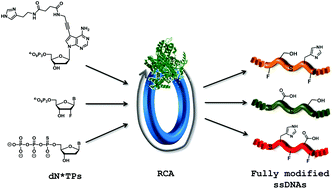Generation of long, fully modified, and serum-resistant oligonucleotides by rolling circle amplification†
Abstract
Rolling Circle Amplification (RCA) is an isothermal enzymatic method generating single-stranded DNA products consisting of concatemers containing multiple copies of the reverse complement of the circular template precursor. Little is known on the compatibility of modified nucleoside triphosphates (dN*TPs) with RCA, which would enable the synthesis of long, fully modified ssDNA sequences. Here, dNTPs modified at any position of the scaffold were shown to be compatible with rolling circle amplification, yielding long (>1 kb), and fully modified single-stranded DNA products. This methodology was applied for the generation of long, cytosine-rich synthetic mimics of telomeric DNA. The resulting modified oligonucleotides displayed an improved resistance to fetal bovine serum.


 Please wait while we load your content...
Please wait while we load your content...